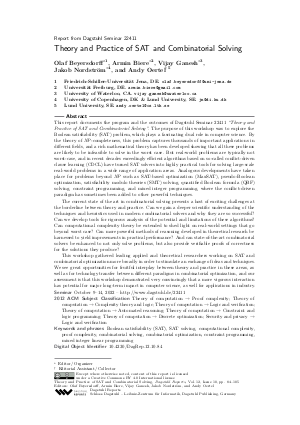Theory and Practice of SAT and Combinatorial Solving (Dagstuhl Seminar 22411)
Authors Olaf Beyersdorff, Armin Biere, Vijay Ganesh, Jakob Nordström, Andy Oertel and all authors of the abstracts in this report
-
Part of:
Issue:
Dagstuhl Reports, Volume 12, Issue 10
Part of: Volume: Dagstuhl Reports, Volume 12
Part of: Journal: Dagstuhl Reports (DagRep) - License:
 Creative Commons Attribution 4.0 International license
Creative Commons Attribution 4.0 International license
- Publication Date: 2023-05-03
File

PDF
DagRep.12.10.84.pdf
- Filesize: 6.95 MB
- 22 pages
Document Identifiers
Subject Classification
ACM Subject Classification
- Theory of computation → Proof complexity
- Theory of computation → Complexity theory and logic
- Theory of computation → Logic and verification
- Theory of computation → Automated reasoning
- Theory of computation → Constraint and logic programming
- Theory of computation → Discrete optimization
- Security and privacy → Logic and verification
Keywords
- Boolean satisfiability (SAT)
- SAT solving
- computational complexity
- proof complexity
- combinatorial solving
- combinatorial optimization
- constraint programming
- mixed integer linear programming
Metrics
- Access Statistics
-
Total Accesses (updated on a weekly basis)
0PDF Downloads0Metadata Views
Abstract
This report documents the program and the outcomes of Dagstuhl Seminar 22411 "Theory and Practice of SAT and Combinatorial Solving". The purpose of this workshop was to explore the Boolean satisfiability (SAT) problem, which plays a fascinating dual role in computer science. By the theory of NP-completeness, this problem captures thousands of important applications in different fields, and a rich mathematical theory has been developed showing that all these problems are likely to be infeasible to solve in the worst case. But real-world problems are typically not worst-case, and in recent decades exceedingly efficient algorithms based on so-called conflict-driven clause learning (CDCL) have turned SAT solvers into highly practical tools for solving large-scale real-world problems in a wide range of application areas. Analogous developments have taken place for problems beyond NP such as SAT-based optimization (MaxSAT), pseudo-Boolean optimization, satisfiability modulo theories (SMT) solving, quantified Boolean formula (QBF) solving, constraint programming, and mixed integer programming, where the conflict-driven paradigm has sometimes been added to other powerful techniques. The current state of the art in combinatorial solving presents a host of exciting challenges at the borderline between theory and practice. Can we gain a deeper scientific understanding of the techniques and heuristics used in modern combinatorial solvers and why they are so successful? Can we develop tools for rigorous analysis of the potential and limitations of these algorithms? Can computational complexity theory be extended to shed light on real-world settings that go beyond worst case? Can more powerful methods of reasoning developed in theoretical research be harnessed to yield improvements in practical performance? And can state-of-the-art combinatorial solvers be enhanced to not only solve problems, but also provide verifiable proofs of correctness for the solutions they produce? This workshop gathered leading applied and theoretical researchers working on SAT and combinatorial optimization more broadly in order to stimulate an exchange of ideas and techniques. We see great opportunities for fruitful interplay between theory and practice in these areas, as well as for technology transfer between different paradigms in combinatorial optimization, and our assessment is that this workshop demonstrated very convincingly that a more vigorous interaction has potential for major long-term impact in computer science, as well for applications in industry.
Cite As Get BibTex
Olaf Beyersdorff, Armin Biere, Vijay Ganesh, Jakob Nordström, and Andy Oertel. Theory and Practice of SAT and Combinatorial Solving (Dagstuhl Seminar 22411). In Dagstuhl Reports, Volume 12, Issue 10, pp. 84-105, Schloss Dagstuhl – Leibniz-Zentrum für Informatik (2023)
https://doi.org/10.4230/DagRep.12.10.84
BibTex
@Article{beyersdorff_et_al:DagRep.12.10.84,
author = {Beyersdorff, Olaf and Biere, Armin and Ganesh, Vijay and Nordstr\"{o}m, Jakob and Oertel, Andy},
title = {{Theory and Practice of SAT and Combinatorial Solving (Dagstuhl Seminar 22411)}},
pages = {84--105},
journal = {Dagstuhl Reports},
ISSN = {2192-5283},
year = {2023},
volume = {12},
number = {10},
editor = {Beyersdorff, Olaf and Biere, Armin and Ganesh, Vijay and Nordstr\"{o}m, Jakob and Oertel, Andy},
publisher = {Schloss Dagstuhl -- Leibniz-Zentrum f{\"u}r Informatik},
address = {Dagstuhl, Germany},
URL = {https://drops.dagstuhl.de/entities/document/10.4230/DagRep.12.10.84},
URN = {urn:nbn:de:0030-drops-178212},
doi = {10.4230/DagRep.12.10.84},
annote = {Keywords: Boolean satisfiability (SAT), SAT solving, computational complexity, proof complexity, combinatorial solving, combinatorial optimization, constraint programming, mixed integer linear programming}
}
